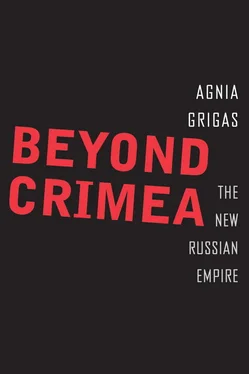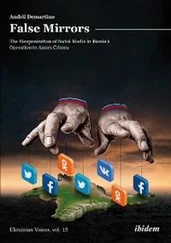Agnia Grigas - Beyond Crimea
Здесь есть возможность читать онлайн «Agnia Grigas - Beyond Crimea» весь текст электронной книги совершенно бесплатно (целиком полную версию без сокращений). В некоторых случаях можно слушать аудио, скачать через торрент в формате fb2 и присутствует краткое содержание. Город: New Haven, Год выпуска: 2016, ISBN: 2016, Издательство: Yale University Press, Жанр: Политика, Публицистика, на английском языке. Описание произведения, (предисловие) а так же отзывы посетителей доступны на портале библиотеки ЛибКат.
- Название:Beyond Crimea
- Автор:
- Издательство:Yale University Press
- Жанр:
- Год:2016
- Город:New Haven
- ISBN:978-0-300-21450-5
- Рейтинг книги:4 / 5. Голосов: 1
-
Избранное:Добавить в избранное
- Отзывы:
-
Ваша оценка:
- 80
- 1
- 2
- 3
- 4
- 5
Beyond Crimea: краткое содержание, описание и аннотация
Предлагаем к чтению аннотацию, описание, краткое содержание или предисловие (зависит от того, что написал сам автор книги «Beyond Crimea»). Если вы не нашли необходимую информацию о книге — напишите в комментариях, мы постараемся отыскать её.
[Contain tables.]
Beyond Crimea — читать онлайн бесплатно полную книгу (весь текст) целиком
Ниже представлен текст книги, разбитый по страницам. Система сохранения места последней прочитанной страницы, позволяет с удобством читать онлайн бесплатно книгу «Beyond Crimea», без необходимости каждый раз заново искать на чём Вы остановились. Поставьте закладку, и сможете в любой момент перейти на страницу, на которой закончили чтение.
Интервал:
Закладка:
THE PUTIN ERA: COMPATRIOTS AS TOOLS OF FOREIGN POLICY
When Vladimir Putin was sworn in as president in May 2000, standing next to the increasingly unwell Yeltsin, he looked the picture of youth, vigor, and strength—a new hope for Russia. Only in his late forties, Putin had already made a meteoric rise from the circle of Yeltsin’s loyalists and had served as prime minister, head of the FSB (KGB’s successor), and first deputy chief of the presidential staff, among other posts. Nonetheless, in May 2000, few could have thought that this little-known man, who had only arrived on Moscow’s political scene in 1996, would come to rule Russia for decades as both president and prime minister. In fact, if Putin wins reelection in 2018 for his fourth presidential term, he will have effectively been in power from December 1999 to May 2024—a total of nearly twenty-five years, which approaches Stalin’s twenty-nine-year tenure.
During his rule, Putin has built on Stalin’s ethnic policies and Yeltsin’s diaspora laws to shape Russia’s compatriot policies as a powerful tool of foreign policy and a means to reimperialize territories of the former Soviet republics. Putin’s policy direction was likely highly influenced by another Yeltsin-era ideologue of Russian compatriot policy, influential political scientist and head of the Russian Council for Foreign and Defense Policy Sergey Karaganov, who served as a presidential adviser from 2001 to 2013, and was named one of the world’s top-hundred public intellectuals by Foreign Policy magazine in 2005. 71In 1992 he published an article proclaiming what was later named the “Karaganov Doctrine” that suggested that Russia should play an active postimperial role and protect Russian speakers. 72Although Karaganov did not use the term “compatriots,” he fully captured the importance of not only ethnic Russians but also Russian speakers in foreign policy. According to Karaganov in 1992, “everything must be done to keep Russian speakers in those regions where they live right now. Not only because we cannot afford to welcome large crowds of refugees, but also because we must leave there strings of influence with a further perspective.” 73It seems that Putin borrowed Karaganov’s ideas, which gained full momentum only in the 2000s. 74Over the course of Putin’s rule some fifteen documents and policies would be adopted (see Table 2), and numerous other initiatives taken in relation to Russian compatriots.
In January 2000 when Vladimir Putin assumed office as acting president he adopted the “National Security Concept of the Russian Federation,” which had already been formulated and approved under the outgoing Yeltsin in December 1999. While the main emphasis of this document was not on compatriots, it did strategically reference Russian citizens abroad. The document stated that the foreign policy of the Russian Federation should spearhead the protection of “the legitimate rights and interests of Russian citizens abroad, including by taking political, economic, and other measures.” 75Certainly the protection of one’s citizens by political, economic, and other means is nothing out of the ordinary for most states. The policy, though, takes on new dimensions in light of the fact that since the 1990s the Russian Foreign Ministry sought to establish dual citizenship in the former Soviet republics, thus turning the Russian diaspora into citizens who could then be protected. This two-fold thrust of Russian foreign policy to (1) provide Russian citizenship to the Russian compatriots in the near abroad and (2) protect the “legitimate rights and interests” of Russian citizens abroad, is set to remain for the foreseeable future. Indeed, in May 2009, less than a year after the Russo-Georgian war fought over protecting Russian citizens and compatriots, an updated document, “Russia’s National Security Strategy to 2020,” reiterated and reinforced the effective defense of the rights and interests of Russian citizens abroad.
Meanwhile, before the compatriots could be turned into Russian citizens by the methods used in Georgia’s South Ossetia and Abkhazia, Moldova’s Transnistria, and Ukraine’s Crimea, the question of how to define and assist them still remained. In June 2000 Putin approved a new document, “The Foreign Policy Concept of the Russian Federation”—the first foreign policy document where compatriots were explicitly mentioned. It stated that “the Russian Federation will seek to obtain adequate guarantees for the rights and freedoms of compatriots in states where they permanently reside and to maintain and develop comprehensive ties with them and their organizations.” 76Two months later a clearer definition of compatriots was finally offered. In August 2001, the “Concept of Support to Compatriots Abroad by the Russian Federation in the Current Period” was released. For the first time ever, the definition of compatriots did not evoke the Soviet Union, and thus former Soviet citizens or their descendants were no longer conceptualized as compatriots. Furthermore, compatriots did not need to be former citizens of Russia or their descendants. Instead, the focus was solely on having some connection to Russia, as compatriots were defined as “constantly living abroad, but having historical, ethnic, cultural, linguistic, and spiritual ties with Russia, trying to preserve their Russian authenticity and having a need to maintain contacts and cooperation with Russia.” 77Again, the definition was broad and malleable thanks to the deployment of fluid and abstract concepts such as cultural or spiritual connections to Russia. Though the new definition was somewhat narrower due to the exclusion of citizens of the Soviet Union, it included a much broader group of people than solely ethnic Russians or Russian speakers abroad and seemingly evoked the peoples of the historic Russian empire.
| DATE (PRESIDENCY) | DOCUMENT | SUMMARY OF CONTENTS |
|---|---|---|
| 10 January 2000 (Putin) | Presidential Decree No. 24, The National Security Concept of the Russian Federation a | One of Russia’s foreign policy goals is defined as protecting the legitimate rights and interests of Russian citizens abroad, including by taking political, economic, and other measures. |
| 28 June 2000 (Putin) | The Foreign Policy Concept of the Russian Federation b | Compatriots are included for the first time in a foreign policy document. |
| 30 August 2001 (Putin) | Concept of Support to Compatriots Abroad by the Russian Federation in the Current Period c | Compatriots are defined as “constantly living abroad, but having historical, ethnic, cultural, linguistic, and spiritual ties with Russia, trying to preserve their Russian authenticity and having a need to maintain contacts and cooperation with Russia.” d |
| 31 May 2002 (Putin) | Federal Law No. 62-FZ On Russian Federation Citizenship e | Simplifies the procedure of acquiring Russian citizenship and grants Russian passports to stateless people from the former Soviet Union. |
| 28 November 2002 (Putin) | Basic Guidelines for Support of Compatriots Abroad by the Russian Federation for 2002–2005 f | Signifies change in official discourse toward compatriots. Previously seen as a problem, compatriots become a resource. |
| 18 June 2005 (Putin) | Government document No. MF-P12-2990, Program of Measures of Organizational, Legal, Administrative, and Socioeconomic Character for the Purpose of the Longterm Stimulation of Voluntary Resettlement of Compatriots From Abroad to Russia g | Document focused on improving longterm migration policy legislation and economic stimulation measures to attract voluntary settlers. |
| 8 July 2005 (Putin) | Government document No. MF-P2-3405, The System of Measures to Support Russian Compatriots Abroad and Facilitate Their Voluntary Resettlement to the Russian Federation h | Sets out measures for compatriots abroad and for voluntary resettlement including financial and transportation assistance. |
| 29 December 2005 (Putin) | Government decree No. 833, The Russian Language Federal Target Program i(2006–2010) j | Supports Russian language teaching as the basis for the development of integration processes in the CIS. Also aims to meet linguistic and cultural needs of compatriots living abroad. |
| 22 June k2006 (Putin) | Presidential Decree No. 637, National Program of Support to Voluntary Migration of Compatriots Living Abroad to the Russian Federation l | Provides a resettlement plan to distribute new arrivals to Russia. mAims to address the Russian demographic crisis. |
| 2 October 2006 (Putin) | Government decree No. 1370-r, Program for Working with Compatriots Abroad, n2006–2008 o | Priorities include consolidation of the Russian diaspora, support for the print and internet resources of compatriot organizations, efforts to preserve national and cultural traditions. |
| 27 March 2007 (Putin) | Ministry of Foreign Affairs, Russian Federation, Foreign Policy Review p | Distinguishes a separate foreign policy dimension called the “humanitarian trend,” which includes protection of compatriots abroad. |
| 12 May 2009 (Medvedev) | Presidential Decree No. 537, Russia’s National Security Strategy to 2020 q | Sets goal of “more effective defense of the rights and lawful interests of Russian citizens abroad.” r |
| 23 July 2010 (Medvedev) | Amendment No. 179-FZ to Federal Law On the State Policies of the Russian Federation with Regard to Compatriots Abroad s | Status of compatriot in addition to principle of selfidentification has to be supported by the person’s activity in preserving the Russian language and culture, and community participation. |
| 7 May 2012 (Putin) | Presidential Decree No. 605, On Measures for Implementation of the Foreign Policy of the Russian Federation t | Calls for budget increase for projects implemented through the Government Commission for the Affairs of Compatriots Abroad. u |
| 12 February 2013 (Putin) | Concept of the Foreign Policy of the Russian Federation v | Aims to ensure “comprehensive protection of rights and legitimate interests of Russian citizens and compatriots residing abroad, to expand and strengthen the space of the Russian language and culture, support consolidation of organizations of compatriots.” w |
| 4 April 2014 (Putin) | Resolution of the State Duma No. 4077-6 GD, Amendments to Article 14 of the Federal Law on Citizenship in the Russian Federation x | Eases procedures for obtaining Russian citizenship by foreign citizens and stateless persons recognized as native Russian speakers. y |
Source: Compiled by the author.
Читать дальшеИнтервал:
Закладка:
Похожие книги на «Beyond Crimea»
Представляем Вашему вниманию похожие книги на «Beyond Crimea» списком для выбора. Мы отобрали схожую по названию и смыслу литературу в надежде предоставить читателям больше вариантов отыскать новые, интересные, ещё непрочитанные произведения.
Обсуждение, отзывы о книге «Beyond Crimea» и просто собственные мнения читателей. Оставьте ваши комментарии, напишите, что Вы думаете о произведении, его смысле или главных героях. Укажите что конкретно понравилось, а что нет, и почему Вы так считаете.












